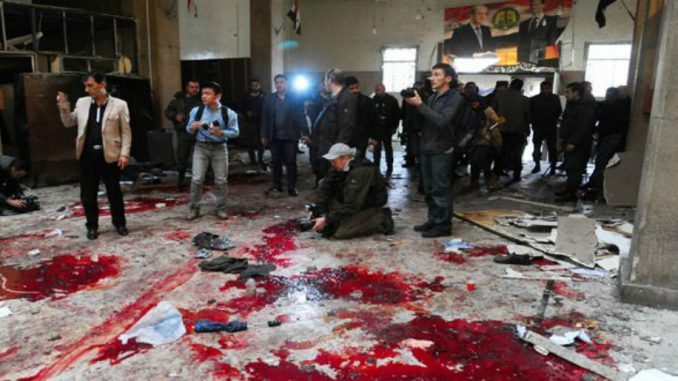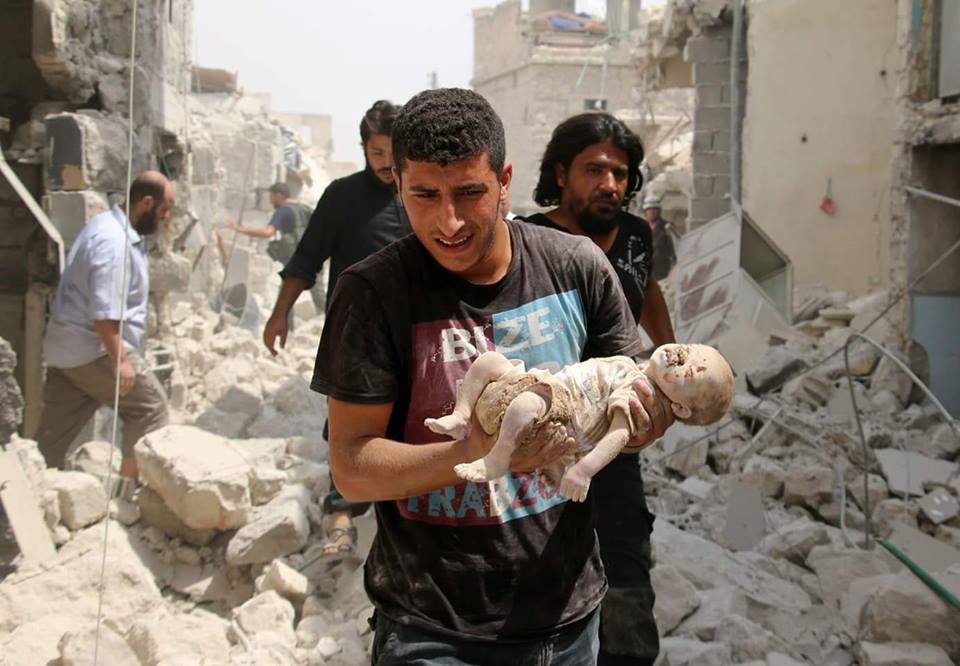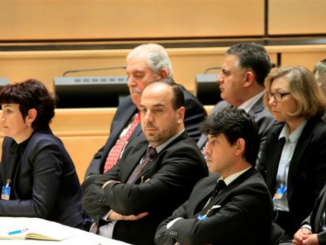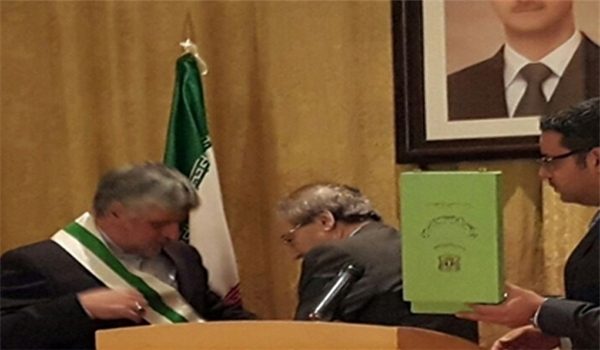
On the anniversary of the Syrian uprising, two suicide bomb attacks killed dozens of people in Damascus on Wednesday, state media reported, in the second such spate of bombings in the Syrian capital in five days.
A suicide bomber detonated his explosive vest in the capital’s main judicial building early in the afternoon, killing at least 31 people and wounding 102 others, Syria’s state news agency SANA reported.
A second attacker detonated himself at a restaurant in the Rabweh area of Damascus, according to SANA, wounding at least 28 people.
The attack on capital’s Palace of Justice, located near the famous and crowded Hamidiyeh market in Damascus, was the latest in a spate of explosions and suicide attacks targeting government-controlled areas in Syria and its capital.
Damascus police chief Mohammad Kheir Ismail told state TV that a man wearing a military uniform and carrying a shotgun and grenades arrived at the entrance of the palace in the early afternoon.
The guards stopped the man, took away his arms and asked to search him. At that point, the man hurled himself inside the building and detonated his explosives, the chief said.
Ahmad al-Sayed, Syria’s attorney general, confirmed that account to state TV, saying that when the security guards tried to arrest the man, he threw himself inside the palace and blew himself up.
“This is a dirty action as people who enter the palace are innocent,” he said, noting that the timing of the explosion was planned to kill the largest number of lawyers, judges and other people who were there at the time.
Ambulances rushed to the scene to transfer casualties to hospital
Syrian state television broadcast footage from inside the courthouse showing blood splattered on a floor littered with papers, a shoe and broken tiles and stones. Images from a hospital showed a man in a suit on a stretcher with blood on his clothes.
“retaliation against Syrian army victories”
“The attack came as a retaliation against the latest victories of the Syrian army and the political victories in Geneva and Astana,” Ahmad said, referring to recent peace talks in Switzerland and Kazakhstan.
State media reported that the second bomber had entered the restaurant and detonated the device after having been chased by security forces.
“These are people who blow themselves up to kill others…,” Interior Minister Mohammad al-Shaar told state media, adding that the security personnel was pursuing other suspects involved in the bombings.
In a similar statement, Minister of Justice Najm Eddin al-Ahmad stressed that “the Syrian judiciary system is determined to continue work to bring to justice all the countries and international organizations that have supported the terrorists in any form.”
Information Minister Mohammad Ramez Tourjman said, “the terrorist bombings reflect the state of collapse within the ranks of the terrorist organizations as a result of the resilience of the Syrian people and the victories of the Syrian Arab Army and its allies.”
He added that “these attacks came in implementation of the polices of the terrorists’ operators, including the Saudi, Qatari, and Turkish regimes, aimed at prolonging the suffering of the Syrian people, calling on the international community to take all deterrent and immediate measures and sanctions against the regimes that are supporting terrorism.”
exploiting the timing of the attacks
The blast followed twin attacks on Saturday targeting Shia holy sites in the capital’s Old City that killed at least 40 people in Damascus, an attack claimed by a hardline coalition known as Tahrir al-Sham, which includes groups with links to al-Qaeda.
In late February an attack in central Homs killed dozens of people with coordinated shootings and suicide bombs that targeted two security headquarters and led to the death of a senior official.
That attack was also claimed by Tahrir al-Sham as well.
However, the timing of the attacks is questionable, as they always happen when there are peace talks meetings ongoing, which the Assad regime representatives use to say again that they are “fighting terrorism in Syria” and to add their own agendas in those meeting, similar to what happened in the last peace talks in Geneva.
This attack can, therefore, be used well in the Astana settlement meeting, which the opposition refused to take part in. The regime side can accuse the opposition of standing behind these attacks and say that opposition only seeks to undermine any political solution.
All these points combined can hint to cooperation with the regime in planning and conducting these attacks.
The Syrian crisis began as a peaceful demonstration against the injustice in Syria. Assad regime used to fire power and violence against the civilians and led to armed resistance. 450.000 Syrians lost their lives in the past five years according to UN estimates, and more than 12 million have lost their homes.



